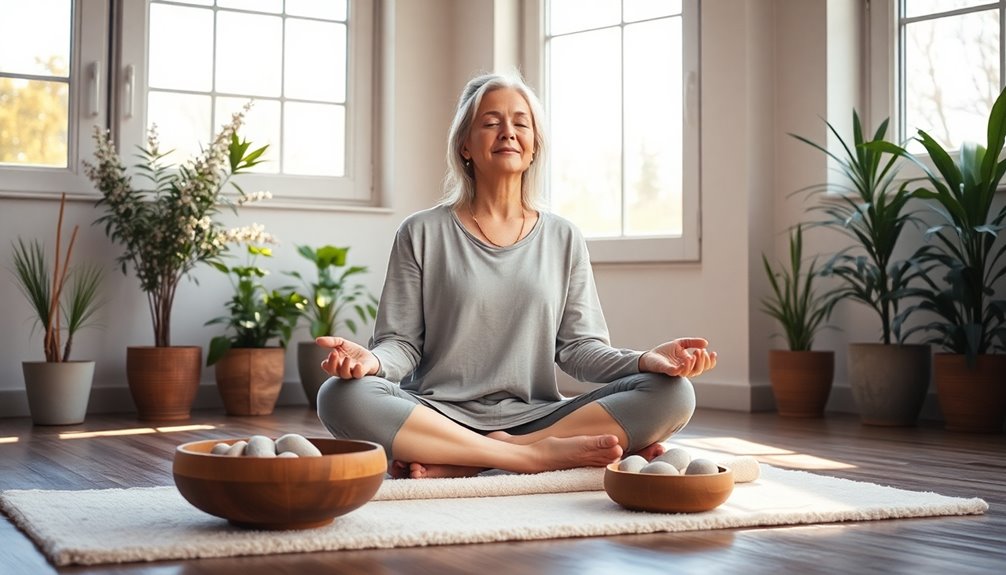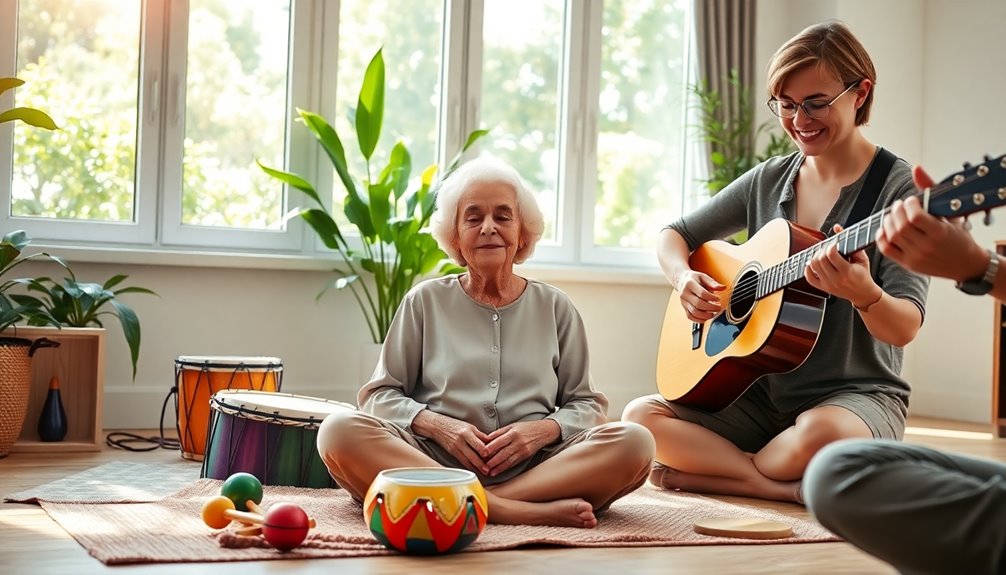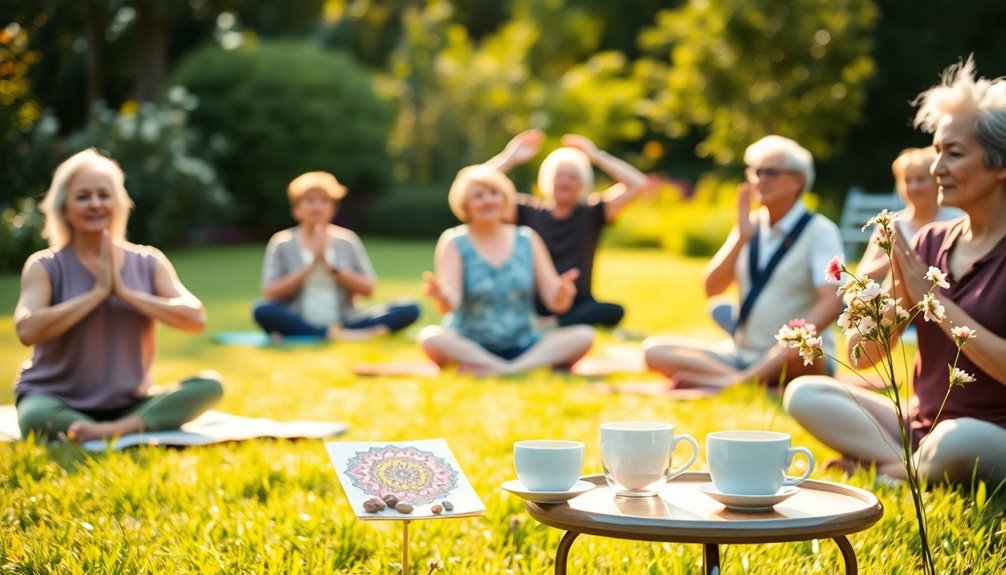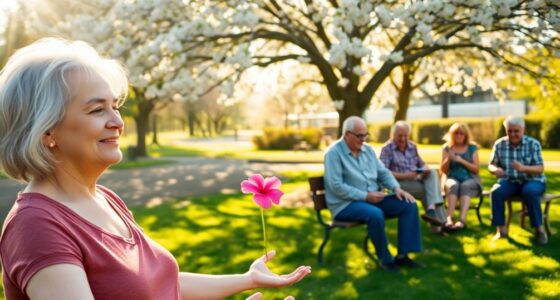If you're looking to boost mental health as a senior, consider mindful breathing exercises, body scans, and journaling. Engage in music therapy or create a mind map to organize thoughts. Don't forget about walking or connecting with nature for added benefits. Reciting positive affirmations can enhance your emotional resilience. Try guided sleep meditation to foster relaxation. Each exercise is designed to improve focus and well-being, so keep exploring to discover more ways to enhance your mental health.
Key Takeaways
- Belly Breathing: Practicing deep belly breathing promotes relaxation and lowers stress, enhancing emotional resilience and focus in seniors.
- Body Scan Technique: Engaging in a body scan helps seniors recognize and release tension, improving emotional regulation and mental well-being.
- Mindful Walking: Taking mindful walks connects seniors with nature, reducing anxiety, improving mood, and fostering social connections.
- Journaling: Encouraging seniors to journal enhances self-awareness, emotional regulation, and cognitive function through reflective expression of thoughts and feelings.
- Music Therapy: Listening to music reduces symptoms of depression and anxiety, enhances memory recall, and fosters social connections, promoting overall emotional stability.
Breathing Exercises

Breathing exercises are a simple yet powerful way to enhance your well-being. One effective technique is belly breathing, where you place one hand on your chest and the other on your stomach.
Inhale deeply for four seconds, hold for four, then exhale slowly. This breathing exercise helps you practice mindfulness, allowing you to focus on your body's sensations and promote relaxation.
Regular mindful breathing can considerably reduce stress and improve mental health, as research shows it lowers cortisol levels. You can practice this anywhere, making it a versatile tool for managing anxiety.
Just five minutes a day can enhance your focus, calmness, and emotional resilience, contributing to a healthier, more balanced life.
Body Scan or Body Awareness

After you've practiced mindful breathing, you can enhance your relaxation further with the Body Scan technique.
This mindfulness practice encourages you to focus your attention on physical sensations from head to toe. Lie on your back with your palms facing upward and feet slightly apart to create a comfortable posture. Engaging in this practice can lead to improved mental health outcomes for seniors, as studies have shown. Research indicates that AI technologies can also facilitate personalized mindfulness experiences tailored to individual needs.
As you scan your body, recognize areas of tension and consciously relax them, promoting a deeper sense of Body Awareness. This exercise not only helps reduce stress but also improves emotional regulation by allowing you to connect with your sensations without judgment.
Engaging in the Body Scan in a quiet environment enhances your focus, greatly boosting your mental well-being and promoting a sense of calmness throughout your day. Additionally, incorporating mindfulness practices can lead to improved mental health outcomes for seniors.
Mind Mapping

Mind mapping is a powerful tool that can help you break down negative thoughts and emotions into manageable parts. This visual technique encourages mindfulness by keeping you focused on the present moment, allowing you to explore your feelings without feeling overwhelmed.
As you practice mind mapping, you'll organize your thoughts and visualize problems, making it easier to tackle issues step by step. This structured approach serves as a creative outlet, helping you express and engage with your emotions more effectively.
Additionally, research shows that engaging in mind mapping can enhance cognitive function and improve your emotional well-being. By incorporating this practice into your routine, you can foster a clearer understanding of your thoughts and feelings, promoting a healthier mindset.
Walking

Walking mindfully in peaceful areas can truly enhance your connection to nature while boosting your overall well-being. As you focus on your surroundings, you'll notice improvements in your mood and a reduction in anxiety. Plus, integrating these walks into your daily routine not only keeps you active but also protects your cognitive health. Additionally, regular physical activity has been shown to reduce risks of cognitive decline and support mental health in seniors.
Mindful Walking Benefits
As you step into the world of mindful walking, you'll discover how engaging with your surroundings can greatly enhance your well-being. This practice encourages you to focus on the sights, sounds, and smells around you, helping to reduce stress and anxiety. Recognizing signs of stagnation can be beneficial in acknowledging when to incorporate mindfulness into your routine.
Studies show that mindful walking in nature lowers cortisol levels, promoting relaxation and a calmer mindset. Not only does it provide essential physical exercise to maintain mobility and balance, but it also improves your mental health by alleviating symptoms of depression. Incorporating a protein-rich breakfast into your routine can further support overall wellness and energy levels throughout the day.
Nature Connection Enhancement
Engaging with nature through mindful walking not only soothes the mind but also deepens your connection to the environment around you.
As you practice mindful walking, you enhance your sensory awareness by immersing yourself in the sights, sounds, and scents of nature. This experience can markedly reduce stress, anxiety, and depression, promoting better mental well-being. Additionally, spending time outdoors can help lower cortisol levels, which is crucial for managing stress. Regular outdoor activities also support a healthier lifestyle, as they promote cleanliness and hygiene in your daily routine.
Research shows that spending time outside lowers cortisol levels, providing a natural way to relax. Plus, walking regularly encourages physical activity, which is essential for maintaining your mobility and overall health. Incorporating multi-functional gear during your walks can also enhance your experience and preparedness for any situation.
If you choose to walk with others, you'll also foster social connections, helping to alleviate feelings of isolation and enhancing your sense of community. Building these connections can also contribute to a healthier outlook on life, as social interaction is vital for mental well-being.
Embrace the benefits of engaging in nature!
Journaling

Journaling offers seniors a valuable way to express thoughts and feelings, fostering emotional well-being and reducing anxiety. By engaging in this mindfulness practice, you can enhance your mental health and boost cognitive function. Regular journaling can also support executive function, which is essential for planning and managing emotions. Furthermore, journaling can help you develop greater self-awareness by reflecting on your thoughts and feelings.
Consider these journaling styles:
- Structured Journaling: Focus on themes like gratitude or daily reflections.
- Unstructured Journaling: Write freely to facilitate self-expression and creativity.
- Positive Experience Writing: Document uplifting moments to improve mood and resilience.
Regular journaling not only helps you process experiences but also supports memory retention and enhances emotional regulation, which is essential for managing emotional responses and behaviors.
As you put pen to paper, you create a personal space for reflection, promoting a sense of calm and clarity.
Embrace this simple yet powerful tool to nurture your mental health and emotional well-being.
Therapeutic Coloring

Therapeutic coloring can be a great way for you to reduce stress while boosting your creativity and focus.
As you immerse yourself in the intricate designs, you'll notice how calming the process can be, allowing your mind to relax.
Plus, it's a fun way to express yourself and keep your fine motor skills sharp! Engaging in activities like therapeutic coloring can also complement mindfulness practices that enhance emotional well-being.
Stress Reduction Benefits
While many activities can help reduce stress, coloring stands out as a particularly effective way for seniors to unwind. This therapeutic exercise promotes mindfulness and offers several stress reduction benefits:
- Induces a meditative state, lowering anxiety
- Decreases cortisol levels, enhancing mental well-being
- Encourages self-expression and creativity
Engaging in coloring not only relaxes your mind but also improves focus and fine motor skills, contributing to cognitive function. Additionally, incorporating self-care routines into your daily life can further enhance the benefits of mindfulness and relaxation.
As you immerse yourself in this creative outlet, you're practicing mindfulness, staying present in the moment. It's an enjoyable and accessible way for older adults to boost mental well-being while unwinding.
Enhancing Creativity and Focus
Coloring can be a powerful tool to enhance creativity and focus, especially for seniors seeking engaging activities. This relaxing activity not only reduces stress and anxiety but also mimics the calming effects of mindfulness meditation. As you immerse yourself in the creative process, you'll find your attention directed solely towards the colors and patterns, enhancing your concentration. Engaging in adult coloring books promotes fine motor skills and improves hand-eye coordination, helping maintain dexterity. Studies show that coloring stimulates various brain areas, fostering creativity and encouraging self-expression. Additionally, incorporating continuous learning into your routine can further enrich the benefits of mindfulness exercises. Regularly engaging in activities that improve digestive health can also positively impact overall well-being, enhancing your ability to focus and enjoy creative pursuits.
Connecting With Nature

Connecting with nature can greatly enhance your well-being, especially as you age. Engaging with the outdoors offers numerous benefits that can considerably improve your mental health.
Here are a few ways to connect with nature:
- Engaging in gardening: Cultivating plants provides physical activity and a sense of accomplishment.
- Mindful walking: Strolling through parks or gardens encourages awareness, boosting your mood and cognitive function.
- Creating indoor greenery: Having a plant on your desk can reduce stress and promote a calming environment.
Reciting Positive Affirmations

Reciting positive affirmations can be a powerful tool for seniors looking to enhance their mental well-being. By repeating affirmations regularly, you can foster a positive mindset, combat negative thoughts, and empower yourself as you navigate life's changes. Pairing these affirmations with breathing exercises can further enhance their effectiveness, promoting relaxation and focus while you recite them. Research shows that this practice can lead to improved mental health outcomes, reducing stress and anxiety levels. Consider writing your affirmations in a journal for personal expression and reflection.
| Affirmation | Benefit |
|---|---|
| "I am capable and strong." | Boosts self-esteem |
| "I am worthy of love and joy." | Enhances emotional resilience |
| "I embrace change with grace." | Promotes adaptability |
Music Therapy

Music therapy can have a powerful emotional impact, helping you connect with your feelings and express yourself.
By selecting soothing tunes, you can create a calming atmosphere that enhances your mindfulness practices.
Engaging with music not only promotes relaxation but also fosters social connections with others.
Emotional Impact of Music
The soothing power of melodies can profoundly affect emotional well-being in seniors. Music therapy isn't just about entertainment; it's a crucial tool for enhancing mental health and relaxation.
Here's how music impacts you:
- Reduces symptoms of depression and anxiety, promoting emotional stability.
- Lowers cortisol levels, alleviating stress and encouraging relaxation.
- Stimulates cognitive function and enhances memory recall.
Engaging with music, whether through listening or participation, allows you to connect with your feelings and share experiences in a supportive environment.
Regular exposure to soothing music can dramatically improve your mood and overall quality of life. Embracing these melodies can be an indispensable part of your journey toward better mental health and emotional well-being.
Selection of Soothing Tunes
Selecting the right soothing tunes can make all the difference in your music therapy experience. Calming music, especially slow-tempo melodies, can greatly reduce anxiety and stress, promoting better mental health. Engaging with these soothing tunes encourages emotional expression and fosters a deeper sense of well-being.
Here's a quick guide to help you select effective music:
| Music Type | Benefits |
|---|---|
| Classical | Enhances relaxation |
| Nature Sounds | Lowers cortisol levels |
| Soft Jazz | Encourages emotional expression |
| Ambient Music | Promotes calm and peace |
| Gentle Folk | Fosters connection and comfort |
Enhancing Mindfulness Practices
Incorporating soothing tunes into mindfulness practices can amplify their effects, especially for seniors seeking calm and clarity. Music therapy not only helps you reach a mindful state but also offers several benefits:
- Reduce stress by lowering cortisol levels through calming melodies.
- Enhance mental health by alleviating anxiety and depression.
- Foster social connections in a group setting, encouraging communication and bonding.
Listening to personalized playlists can evoke cherished memories, bringing awareness to your emotional responses.
Engaging with music also stimulates cognitive functions and memory recall, making it an effective tool for maintaining mental sharpness.
Guided Sleep Meditation

How can guided sleep meditation transform your nightly routine? By incorporating guided meditation into your evening, you can redirect your focus from negative thoughts to a state of deep relaxation.
Listening to soothing voice guidance, you'll be led through calming visualizations and breathing exercises that ease you into a restful sleep. Research shows that this practice can greatly improve sleep quality and reduce insomnia symptoms, especially for seniors.
The tranquil environment created by calming background sounds helps enhance your mental health, promoting better emotional regulation and lowering cortisol levels.
Make guided sleep meditation a regular part of your routine, and you'll experience long-term benefits that contribute to your overall well-being and restful nights.
Frequently Asked Questions
What Are the Mindful Movements for Seniors?
Mindful movements for seniors include gentle yoga, tai chi, and chair yoga. These activities focus on enhancing flexibility and balance, which are essential for preventing falls.
You can also try mindful walking, especially in nature, to connect with your surroundings and reduce stress. Engaging in these practices helps you become more aware of your body, improves coordination, and promotes overall well-being.
Regular participation can lead to better mental health and resilience.
What Are Mindfulness Techniques for Mental Health?
You can explore various mindfulness techniques to boost your mental health.
Start with mindful breathing, focusing on your breath to calm your mind.
Try body scan meditation to connect with your body and release tension.
Incorporate gratitude exercises by reflecting on what you're thankful for, which fosters positivity.
Engage in nature-based activities, like mindful walking, to enhance your mood and reduce stress.
Each technique cultivates a sense of peace and improves overall emotional well-being.
How Do You Teach Mindfulness to the Elderly?
When you teach mindfulness to the elderly, start with simple techniques like mindful breathing or body scan meditation.
Use apps or local classes to guide them, making it engaging. Incorporate gentle yoga or tai chi for both mindfulness and physical well-being.
Encourage nature walks or gardening, connecting them to the environment.
Why Mindfulness Activities for Service Users in Elderly Care Settings Are Important?
Mindfulness activities are essential for service users in elderly care settings because they help reduce anxiety and depression.
When you engage in these exercises, you lower stress levels and improve emotional regulation.
You'll also find that regular mindfulness practices can boost your cognitive function and memory, making daily life easier.
Plus, these activities foster social connections, which can combat feelings of loneliness and isolation, ultimately enhancing your overall quality of life.
Conclusion
Incorporating mindfulness exercises into your daily routine can greatly boost your mental health, especially as you age. Did you know that studies show practicing mindfulness can reduce anxiety and depression by up to 58% in seniors? By engaging in activities like breathing exercises, journaling, or connecting with nature, you're not just promoting relaxation; you're enhancing your overall well-being. So, why not give these exercises a try? Your mind and body will thank you for it!









